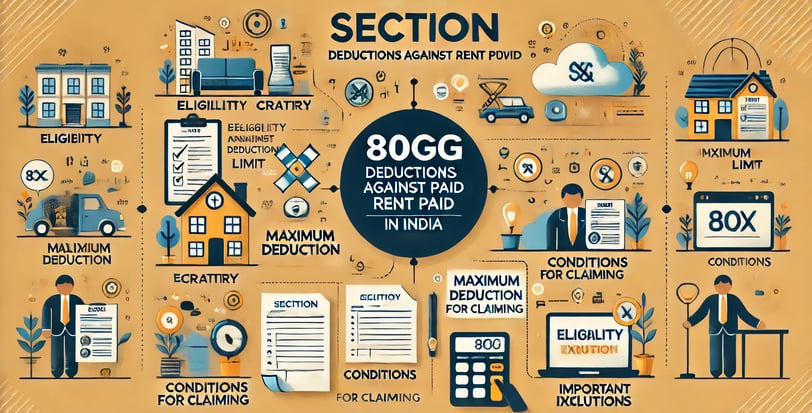Section 80GG in 2025: Deductions for Rent Paid, Eligibility, and Conditions
Learn about Section 80GG in 2025 – eligibility, conditions, and how to claim deductions for rent paid. Maximize tax savings under the old tax regime with this comprehensive guide.
2/6/20253 min read


In India’s dynamic tax landscape, Section 80GG of the Income Tax Act serves as a lifeline for individuals who pay rent but do not receive House Rent Allowance (HRA) from their employers. As of 2025, this provision remains a critical tool for reducing taxable income, especially for self-employed professionals, salaried employees, and Hindu Undivided Families (HUFs). This article explores the eligibility criteria, calculation methods, and key conditions to claim deductions under Section 80GG in 2025, ensuring you maximize tax savings while complying with regulations.
Key Features of Section 80GG in 2025
Applicable Under the Old Tax Regime
Section 80GG deductions are not available under the new tax regime (Section 115BAC). Taxpayers must opt for the old regime to claim this benefit.
Deduction Limit
The maximum deduction is the lowest of three amounts:
₹5,000 per month (₹60,000 annually).
25% of total income (adjusted for capital gains and other deductions).
Rent paid minus 10% of adjusted gross total income.
No HRA Eligibility
Individuals cannot claim both HRA and Section 80GG in the same financial year. If HRA is part of your salary (even temporarily), you forfeit Section 80GG benefits.
Eligibility Criteria for Section 80GG
To qualify for deductions in 2025, taxpayers must meet these conditions:
1. No Ownership in the Same City
You, your spouse, or minor child must not own residential property in the city where you work or reside. Ownership in other cities is permissible.
2. Valid Rent Agreement
A formal rental agreement is mandatory. For instance, if you live in a parent-owned property, you must sign a rent agreement and ensure the rent is declared as income in their tax returns.
3. Submission of Form 10BA
This declaration form confirms you do not receive HRA and own no property in the city of residence. It requires details like rent amount, landlord’s PAN (if annual rent exceeds ₹1 lakh), and property address.
4. Self-Employed and Salaried Individuals
Both categories can claim deductions, but businesses and companies are excluded.
How to Calculate Section 80GG Deductions
Let’s break this down with an example:
Scenario: Mr. Sharma earns ₹8.5 lakh annually and pays ₹35,000/month rent in Mumbai.
Annual Rent Paid: ₹4.2 lakh.
10% of Adjusted Income: ₹85,000.
Rent Paid – 10% Income: ₹4.2 lakh – ₹85,000 = ₹3.35 lakh.
25% of Income: ₹2.12 lakh.
Standard Limit: ₹60,000.
Deduction Allowed: ₹60,000 (the lowest of the three values).
Required Documentation
Form 10BA: Available on the Income Tax Department’s website or via HR departments.
Rent Receipts: Must include the landlord’s name, address, and payment period. Affix a revenue stamp if rent exceeds ₹5,000/month.
Landlord’s PAN: Mandatory if annual rent exceeds ₹1 lakh.
Common Misconceptions
Owning Property in Another City: You can claim deductions if you rent in one city and own property elsewhere.
Paying Rent to Parents: Permissible if a valid agreement exists and parents report the income. However, some sources caution against this.
New Tax Regime Benefits: Section 80GG is exclusively for the old regime.
How to Claim Section 80GG Deductions
Opt for the Old Tax Regime while filing ITR.
Download and Submit Form 10BA with rent receipts and landlord details.
Declare No HRA in your income sources.
Benefits of Section 80GG
Tax Savings: Reduces taxable income by up to ₹60,000 annually.
Flexibility: Available for furnished/unfurnished accommodations.
Inclusivity: Benefits self-employed individuals often excluded from HRA schemes.
Conclusion
Section 80GG remains a vital tax-saving tool in 2025 for renters without HRA. By adhering to eligibility rules, maintaining proper documentation, and opting for the old tax regime, taxpayers can significantly reduce their liabilities. Always consult a tax advisor to navigate complexities and ensure compliance.
FAQs
Q1. Can I claim Section 80GG if I have a home loan?
Yes, if you live in a rented property and own a home elsewhere, you can claim both Section 80GG and home loan interest deductions.
Q2. Is a rental agreement mandatory?
Yes, without it, your claim may be rejected during scrutiny.
Q3. Can NRIs claim Section 80GG?
Yes, if they rent property in India and meet other criteria .
NCR Housing
Your guide to NCR housing insights and tips.
Subscribe us
© 2025. All rights reserved.
